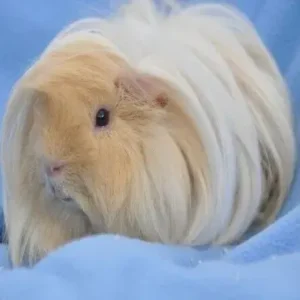History/Origin
The Skinny Guinea Pig has its roots in spontaneous genetic mutations that led to the development of hairless guinea pigs. The breed first emerged in laboratories during scientific experiments, and its unique appearance quickly captured the attention of guinea pig enthusiasts.
The Skinny Pig was introduced to the pet trade in the 1990s, and they have gained popularity over the years with Cavy enthusiasts and pet owners alike. There is another breed of hairless Guinea Pig known as the Baldwin Guinea Pig, which has even less hair than the Skinny Pig.
Personality
Despite Skinny Pigs’ lack of fur, they are as warm and friendly as haired guinea pigs. They are known for their friendly and affectionate nature. They are social animals and enjoy the company of other guinea pigs. Skinny Pigs are not aggressive or territorial, and they can get along with other pets, such as dogs and cats.
Physical Appearance
Skinny Pigs are hairless guinea pigs that have a few hairs on their face, legs, and feet. Unlike some other Guinea Pig breeds (such as Baldwin) that lose hair over time, Skinny Pigs are born without hair. They come in various shades of skin tone and have a saggy appearance due to their lack of fur.
- Size
They are smaller in size than their hairy counterparts, weighing between 1.5 to 2.5 lbs and measuring 7 to 10 inches in length.
- Skin Color
Skinny Pigs boast various skin colors. Common shades include pink, black, and mottled patterns.
Gender Differences
Both male and female Skinny Pigs are similar in appearance and behavior as pets. There are very few significant differences between their temperament, which makes both male and female Skinny pigs ideal pets.
Feed/Nutrition
Here’s a guide to feeding and nutrition for Skinny Pigs:
- Hay: Hay forms the foundation of a Skinny Pig’s diet. High-quality grass hay, such as timothy hay or orchard grass, should be available at all times. The fiber in hay aids in digestion and helps maintain dental health.
- Fresh Vegetables: Introduce a variety of fresh, leafy greens to provide essential vitamins and minerals. Include options like kale, spinach, romaine lettuce, and cilantro. However, be cautious with high-oxalate greens and limit their intake to prevent potential health issues.
- Guinea Pig Pellets: Commercial guinea pig pellets enriched with Vitamin C are an essential component of their diet. Ensure the pellets are specifically formulated for guinea pigs and do not contain added sugars. Offer the pellets in measured amounts to avoid overfeeding.
- Fruits: Fruits can be given as occasional treats, offering a sweet and nutritious supplement to their diet. Apples, strawberries, and melons are generally well-received. However, moderation is key, as fruits are high in natural sugars.
- Fresh Water: Provide access to clean and fresh water at all times. Hydration is crucial for overall health, and Skinny Pigs may require more water than their furry counterparts due to their lack of fur.
Health
Here are some essential health care tips to help your Skinny Pig live a happy, healthy life:
- Skin Health: The sensitive skin of Skinny Pigs is more susceptible to skin infection, sunburn, injuries, and dryness. Provide a shaded area in their habitat to protect them from direct sunlight, and consider applying pet-safe sunscreen to exposed areas when they venture outdoors.
- Respiratory Health: Skinny Pigs are susceptible to respiratory infections, so maintaining a clean living environment is paramount. Avoid exposure to drafts and cigarette smoke, and promptly address any signs of coughing or wheezing.
- Weight Management: Due to their high metabolism, Skinny Pigs may be prone to weight loss. Monitor their weight regularly and adjust their diet accordingly. Obesity and malnutrition can both pose health risks.
- Parasite Prevention: Keep a vigilant eye for external parasites, such as mites, which can affect Skinny Pigs. Regular grooming and maintaining a clean habitat help in preventing infestations. Consult with a vet for appropriate parasite prevention measures.
- Vitamin C Supplementation: Since Skinny Pigs, like other guinea pigs, cannot produce Vitamin C on their own, ensure they receive an adequate amount through their diet or supplements. Vitamin C deficiency can lead to scurvy, a serious health condition.
- Observation and Bonding: Spend quality time observing and bonding with your Skinny Pig. This not only enhances their mental well-being but also allows you to detect subtle changes in behavior, which could be early signs of health issues.
- Regular Vet Check-ups: Schedule regular veterinary check-ups to monitor your Skinny Pig’s overall health. Skin conditions, dental issues, and weight fluctuations can be addressed proactively through routine examinations.
Care and Grooming
Caring for a Skinny Pig involves unique considerations due to their hairless nature. While they may not have traditional fur, Skinny Pigs still require dedicated care and grooming to keep them healthy and comfortable.
Here’s what Guinea Pig care includes:
Bathing Routine: Contrary to some perceptions, Skinny Pigs do require regular baths to maintain good hygiene and skin health. Use a mild, fragrance-free guinea pig shampoo, and make sure the water is warm but not too hot. Gently massage their skin during the bath, paying attention to folds and creases, and be sure to rinse thoroughly.
While regular baths are necessary, over-bathing can strip the skin of essential oils and lead to dry skin. Aim for a bathing routine of once every few weeks or as recommended by your veterinarian.
Moisturizing: After a bath, apply a hypoallergenic, non-toxic moisturizer to their skin. The hairless nature of Skinny Pigs makes them susceptible to dryness, and a good moisturizer helps keep their skin supple and healthy. Consult with your vet to choose a suitable product for your pet.
Nail Trims: Regular nail trims are essential for Skinny Pigs. Their nails can grow quickly and may become sharp, leading to discomfort or potential injuries. Use a small, pet-friendly nail clipper, and be cautious not to cut into the quick. If you’re unsure, seek guidance from a veterinarian or a professional groomer.
Ear Checks: Skinny Pigs are prone to ear wax buildup, which can lead to ear issues if not addressed. Regularly check their ears for any signs of wax accumulation and clean them gently using a soft, damp cloth. If you notice excessive wax or signs of irritation, consult with a vet for proper care.
Maintaining a Clean Habitat: Ensure that your Skinny Pig’s living environment is clean and well-maintained. Regularly clean their cage, removing any bedding or waste to prevent skin issues and maintain a healthy living space.
Temperature Considerations: Due to their lack of fur, Skinny Pigs may be more sensitive to temperature changes than a regular Guinea Pig. Provide a warm and cozy living environment, especially during colder months, and avoid exposing them to drafts or extreme temperatures.
Rescue Groups
Consider adopting a Skinny Pig from reputable rescue groups that specialize in guinea pig breeds.
Buy Skinny Pigs
If you’re looking to purchase a Skinny Pig, reputable breeders and online platforms like:
Interesting Facts
- Skinny Pigs are used in dermatology labs for experimentation related to human skin.
- Their high metabolism makes them more active than their furry counterparts.
- Skinny Pigs have become popular in the world of exotic pets, with enthusiasts appreciating their unique appearance.
Best For
Ideal for individuals or families seeking an affectionate small pet. Can be a great choice for an emotional support animal.
Top Names
| Male Skinny Pig Names | Female Skinny Pig Names |
| Gizmo | Luna |
| Sputnik | Willow |
| Peanut | Pebbles |
| Pixel | Daisy |
| Nugget | Tinkerbell |









